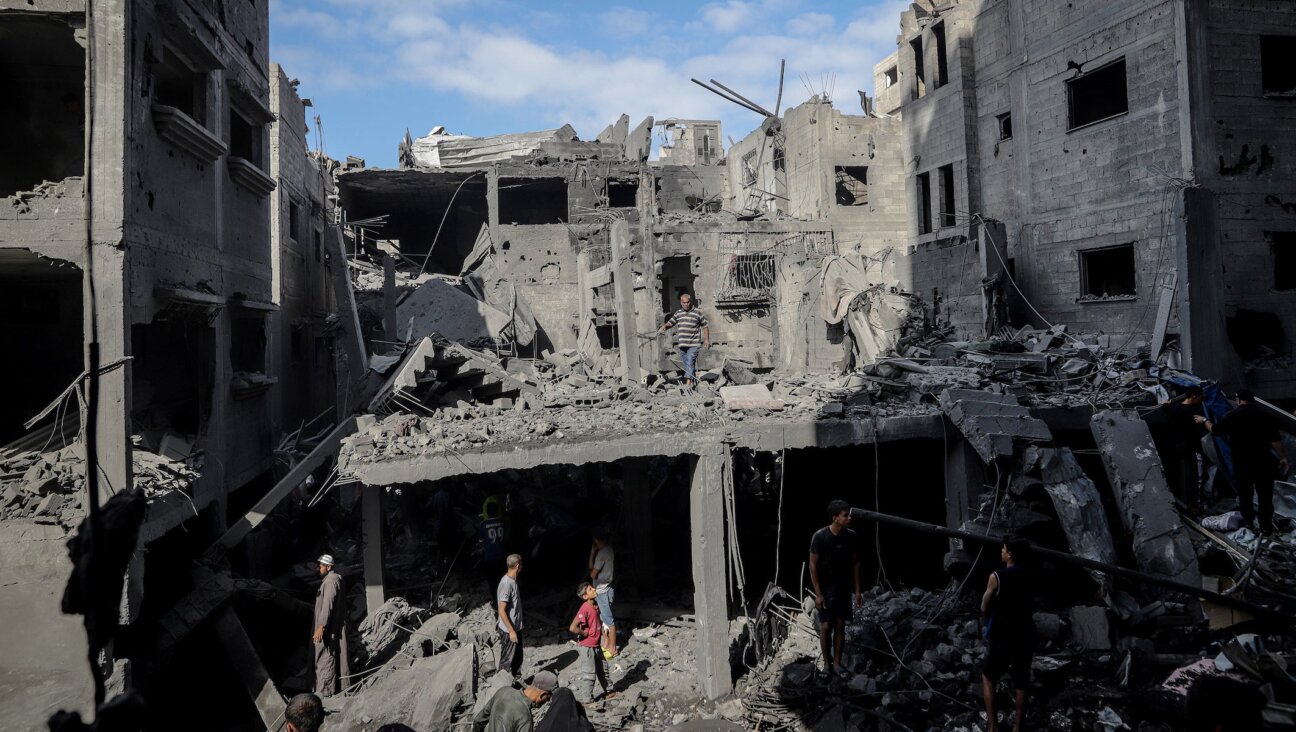Giving One’s Life
There’s a Hebrew term that looks like it’s going to be heard a lot in the coming months. It’s mesirut-nefesh, which means, literally, “giving one’s life,” and, in ordinary language, “devotion” or “giving one’s all.” But for the settlement movement that is now gearing up to fight this summer’s planned disengagement from Gaza, mesirut-nefesh has taken on a new and ominous significance.
Actually, this “new” significance is close to the original meaning of the term. We encounter this meaning in texts from the early centuries of the Common Era, such as the one in the Tosefta to the Mishnah of Terumot that says: “If Gentiles [i.e., the Roman authorities] say to a group of [Jewish] people, ‘Surrender one of your members so that we may kill him or else we will kill you all’ — they must all let themselves be killed rather than give the life [yimseru lahem nefesh] of a single Jew.” Mesirut-nefesh in early rabbinic literature thus means the knowing exposure of someone, whether another person or oneself, to certain or likely death.
The Tosefta enjoined Jews to die rather than surrender a fellow Jew to execution at the hands of the Roman authorities, because, according to rabbinic law, there are three things that Jews are commanded to refrain from even if this means being killed themselves: committing or abetting an act of murder, being a party to incest and engaging in idol worship. Any other infraction of the laws of Judaism, no matter how grave, is permissible in order to save one’s own or someone else’s life. This is known in rabbinic terminology as the principle of piku’ah. nefesh, saving life, as in the well-known rabbinic dictum piku’ah. nefesh doh.eh shabbat, “Saving life takes precedence over the Sabbath laws.”
For the religious adherents of an “undivided land of Israel” who are spearheading the opposition to the Gaza disengagement, the principle of piku’ah. nefesh would appear to mean, on the face of it, that no opposition to the planned evacuation this summer is permitted to endanger life. As great as might be the commandment of yishuv eretz-yisra’el, “settling the land of Israel,” it is not one of the three things for which a Jew is expected to die. Piku’ah. nefesh takes precedence here, and violently resisting the evacuating soldiers or policemen in ways that might lead to either their deaths or the deaths of the resisters should, therefore, be strictly forbidden.
Yet the extreme militants in the anti-disengagement struggle have been loath to accept such a view. They have looked for an alternative halachic ruling — and have found it in the concept of mesirut-nefesh, interpreted as the opposite of piku’ah. nefesh. In the words of a recent statement by one of their spiritual leaders, Rabbi Shlomo Aviner:
“Every child knows that mesirut-nefesh is commanded in the case of three sins: idol worship, incest and murder. The land of Israel does not appear in this list…. [Yet] every people on earth living in its own land and state has to [be ready to] defend itself against the enemies who would destroy it…. In permitting just wars of this sort, Jewish law commanded mesirut-nefesh. There was no need for it to be explicit, as in the case of idol worship, incest and murder, because the possibility of death in war is something that is taken for granted…. Wars may be fought to safeguard possession of the land of Israel — and the settlements safeguard it, too.”
Rabbi Aviner’s remarks form the following syllogism: 1) There is a fourth activity, to which piku’ah.-nefesh does not apply, that is defending the land of Israel as in war; 2) the settlements exist to defend the land of Israel also; 3) therefore, pikuah.-nefesh does not apply to the settlements either. On the contrary, their existence calls for mesirut-nefesh, the willingness to risk life — whether one’s own or that of another.
This is not just the opinion of one rabbi. The idea that the principle of mesirut-nefesh justifies violent resistance to the evacuation of the Gaza settlements has been spreading in the settlement movement. According to Nadav Shragai, a correspondent for the Hebrew daily Ha’aretz:
“At the heart of the matter lies the recognition that there is a halachic obligation to be killed rather than take part in the evacuation of settlements and settlers from the land of Israel…. As the date of disengagement draws closer, there is increased concern that the term mesirut-nefesh will be used in three senses: as an expression of willingness to make effort and sacrifice, as an expression of the willingness to risk one’s life and [even] as an expression of the intent to commit suicide [in protest against the evacuation].”
Just as the halachic expression din rodef, the permissible preventive killing of someone who endangers the lives of others, circulated widely among the extreme right wing in Israel in the months before the Rabin assassination, and was a harbinger of it, the growing use of the expression mesirut-nefesh signals the likelihood of a hot summer ahead of us. It is sad to see history threaten to repeat itself.
Questions for Philologos can be sent to [email protected].
















